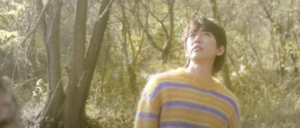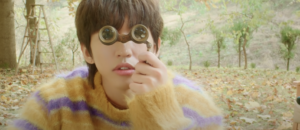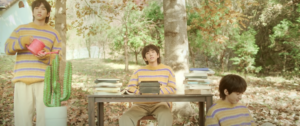
Sing Again champion Lee Seung-yoon is a musician whose music is not easy to listen to. It is not something you can just listen to on the subway and leave as background music. His music demands attention, it demands thought, and his latest studio album, Even If Things Fall Apart, which is entirely self-composed, is no different.
In an interview about this album he stated that he “would like to be a musician who delivers two messages — ‘You’re unique in your own way’ and ‘You mean nothing in this vast world’” through his songs. Indeed, the cynical tone that many of his songs carry also contain undercurrents of hope and offer peeks into the unique way Seung-yoon views this confusing world.
His music is also famously genre-defying – while most of his songs would broadly be classified as belonging to the rock genre, he throws in enough surprising twists throughout the tracks such that listeners are often left clinging tightly to his voice as they are led into his world.

“Docking” opens off the nine-track album with a bang – the intro itself already features an energetic and insane build-up that will definitely leave listeners hanging on for more. Without a doubt, the star of this song is the electric guitar, which livens up the track with its (many) catchy guitar riffs. Thanks to its instrumentation, and the ingenious vocal harmonies Seung-yoon works into the song, it feels fresh, even though it is probably the most conventional track of this album.
“A Puff of Cloud” is where things start to get interesting, especially on the musical front. Opening with a stunning bass riff, it sounds like a classic rock offering at first, especially with Seung-yoon putting his raspy voice on full display. After the first third of the song ends however, it starts to feel like a rollercoaster ride, with its mind-boggling shifts in rhythm and chord progressions. The bridge in particular (those drums!) is really effective in its build-up to a climax, although Seung-yoon’s voice does get drowned out by the all-round powerful instrumentation at a certain point.
The rock spirit continues in full force with “Open Your Textbook”, the first of three title tracks of this album. This track has a harder and edgier style, but its sobering lyrics sufficiently justifies the anguish with which Seung-yoon sings. Beneath its benign-sounding title, this song reveals the strange relationship that exists between textbooks and tragedies, casting a cynical light on the way our world views each tragedy that occurs.
To prevent tragedy, we need textbooks
We need more tragedies to make a textbook
You will be blessed by all for your tragedy
Through the song, Seung-yoon criticises the way these tragedies are exploited and turned into learning points for others, without regard for the weight of these events and the scars they leave behind. Towards the end of the song however, he reaches a new conclusion.
Actually I’m doing the same
in my lyric writing
Can you bring your tragedy to the table?
I’ll try to comfort you nicely
This moment of realisation, which comes in the bridge, that he is actually behaving in the same manner as those whom he has been criticising, is the true climax of the song. Seung-yoon proves himself here to be a genuinely introspective musician, one who considers the impact of his actions at every step, and conveys these thoughts honestly through his music. Whether or not his musical style is to your liking, this alone makes him an artist that is truly worthy of respect.

The raw angst of “Open Your Textbook” is slightly toned down in “Death Sentence”, which opens with Seung-yoon’s delightful low register. An air of resignation pervades the first verse of the track, conveyed effectively by the almost monotonous way he sings. He clearly has not fully given into his “death sentence” however, and the dynamicism of his singing and the instrumentation that picks up gradually clue us into that.
Sure enough, by his second verse, he expresses his will to live:
I was sentenced to death
in the minds of some
Because I am not Jesus, even after three days
I didn’t survive
Sorry but I will live
Interestingly enough, following this bold declaration is an instrumentation section which prominently features a harsh, death-knoll sounding like tone. It serves as a reminder that death will come for all of us, one day, no matter how desperately we want to live, and Seung-yoon excellently expresses this mix of hope and futility in this track.
With its whimsical introduction, “Even If Things Fall Apart”, the second title track of this album, stands out from the get-go. Even though similar instruments are employed for the whole album, this song’s inviting atmosphere is completely different from the first four tracks.
Seung-yoon sings more soulfully and lazily here, intentionally slurring some of his words to achieve this effect. The backing harmonies are also masterfully employed and the mixing of this track is artfully done. Thanks to the heavenly interludes interpersed throughout the song, the entire track passes by in a flash, proving how engaging it truly is.
After that brief respite, we dive right back into cynicism with the satirical track “O Come, O Come, Comedy”. Seung-yoon sings here about the way his hard work was turned into a joke, a funeral song was sang as a congratulatory song and how people made light of the messages he tried to convey through his music. It conjures up a self-portrait of Seung-yoon, the misunderstood artist. Although he has been releasing music for many years, his genre-defying music style, which was probably unfamiliar to mainstream audiences, probably played a part in why he remained “unknown” for so long before Sing Again.

From the start of the song, there is a somewhat negative meaning attached to the word ‘comedy’, but this slowly evolves through the simultaneously space-like and rock-like track as he lets some of that cynicism go. Interestingly, this change happens within an instrumentation section, where the lyrics, which were relegated to background vocals, become less discernible. Seung-yoon closes the song with his signature rap, repeating the lyrics “life is really a comedy, but sometimes harmony, I laughed more and sometimes cried” – a reflection of the way he has decided to come to terms with his reality.
The final title track of the album, “Words Befitting One Who Loves Someone”, signals a clear shift in the mood of the remaining tracks. The angst over, he ushers in hope and a renewed love for the precious people around him. Its warm instrumental is instantly ear-catching, and listeners are transported to a relaxing beach with waves ebbing and rising. He invokes a bit of onomatopoeia with his repeated line “다음/da-eum” (meaning next in Korean) which seem to follow the rhythm of waves.
In line with the peaceful imagery of the song, Seung-yoon sings in a relaxed and comfortable manner for what might be the first time in the album. The track still has its twists though, in the use of unexpected rhythms in its choruses as well as the delightful instrumental surprises it serves up throughout the track. His monotonous voice makes a startling (and slightly jarring) return in the bridge but the instrumental build-up that follows is truly a force of nature – the sound of these waves that are coming at increasing intensity is so clear. The percussion section at the end is absolutely delightful, and it slows to a satisfying finish.
For an album that has been so genre-defying all this while, the quiet piano introduction of “A Vast Heart” truly shocked me. This, coupled with the gentle way Seung-yoon begins singing about contemplating the meaning of love kept that illusion of a “typical ballad” going for… about a verse. The track quickly swells into a grand sound befitting its title, and the harmonies return in full force. Even with all the twists and turns this heart-tugging melody takes, the emotion and sincerity behind this song is never lost. Trust Seung-yoon to prove that heartfelt words can also be conveyed through grand musical pieces. There is a nice blend of old-school rock and Seung-yoon’s unique musical flavour going on here – it is somehow both nostalgic and fresh at the same time.
Seung-yoon ends off this stunning album with “Piece Together Scattered Dreams”, an uplifting song that he sings both to himself and to his listeners.
When a rusted guitar string sings a beautiful song
When a small flower accidentally stepped on and stands up again
Dreams torn into pieces
Gather each one and call it hope
The bittersweet undercurrents of this song are so poignant, both lyrically and musically. Given the many years that he has struggled as an “unknown” musician, he definitely knows what it feels like to be in despair. And yet, he has finally found his success without having to give up his unique musical style – Seung-yoon is living proof that we can still have hope in this cruel world.
Having a chorus of voices singing “piecing together scattered dreams” and cheering loudly at the end is such an empowering way to conclude this track, and the whole album. This is just the beginning for Seung-yoon, who I believe will continue to stay true to himself, and strive on, even if his unconventional music never becomes fully accepted by mainstream listeners.
(Youtube [1] [2]. Lyrics via LyricsTranslate. Korea Herald. Images via ShowPLAY Entertainment.)


